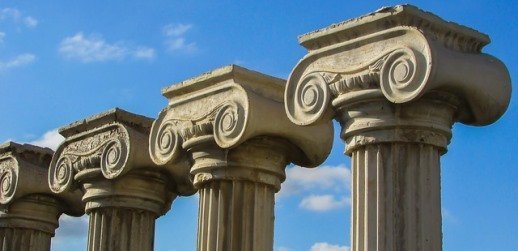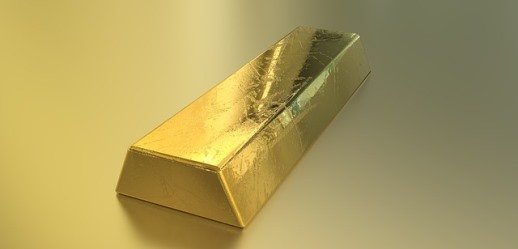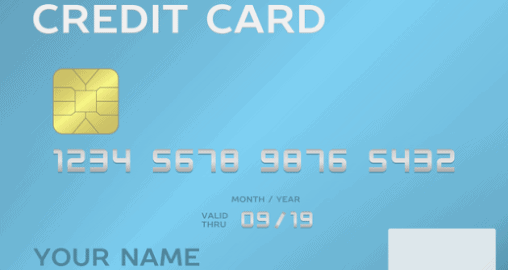What is wealth and how do you create it? Let’s look at what I call the 4 pillars of wealth creation.

I have always been interested in wealth and the wealthy. You may have noticed that Dividends Diversify has a whole main menu area dedicated to building wealth.
Many of the articles in that area focus on the demographics of millionaires. And, the habits of millionaires.
The Pillars Of Wealth Creation
With all the research and writing I have done on the topic, I wanted to reduce some of the things I have learned down to a few essential goals.
And, share those concepts with you. I call them the 4 pillars of wealth creation.
Definition of wealth
Before we start talking about wealth building, let’s define wealth.
Wealth: According To The Dictionary
Merriam-Webster dictionary defines wealth as follows:
Wealth is an abundance of valuable material possessions or resources.
Honestly, this textbook definition doesn’t really mean much to me. So I developed a more relatable definition of wealth for our purposes today.
Wealth: In My Terms – And Maybe Yours?
Wealth is about a process in which we create and deliver value.
Furthermore, wealth creation is about long term approaches that involve your personal development. And this development results in your ability to create and deliver more and more value over time.
Creating and delivering value results in the ability to make money and accumulate valuable resources. Those resources are how we measure a person’s wealth.
Now, that is pretty thought-provoking to me. Stop and think about it for a minute. Think about how it relates to you and your own pursuit of wealth.
The Foundations Of Wealth Creation
Since that is the definition of wealth that I’m using today, I want to unpack it. And, I want to unravel it before we get started.
So, let’s emphasize some key points about creating money in abundance.
Wealth is a process.
We build wealth by creating and delivering value.
We think about delivering value and creating wealth over the long-term. And, we do this by practicing good money habits and through continuous self-development.
By delivering more and more value, we are able to earn and accumulate more and more resources. These resources are accumulated over the long-term. Therefore, wealth is not about getting rich quick.
Wealth is defined by resources. And, I like the word resources. Here’s why…
Money, investments, and property are some important aspects of wealth-building. On the other hand, it is not just about monetary assets like these.
There are other types of valuable resources you should accumulate to create true wealth. And we will touch on those in a moment.
But now, let’s take this definition and review the 4 pillars of wealth creation.
Pillars Of Wealth Creation #1 – Making Money

When a person can create and deliver value, normally they can make money and increase their income over time. So, the ability to make money is the first resource we are going to discuss.
Have A Great Career
One way of making money is to have a great career in the working world.
Becoming a millionaire is one way to identify wealth. And, statistics show that most millionaires today work for someone. In fact, less than 20% are self-employed.
These people develop valuable and marketable skills. And sell them to an employer in exchange for compensation and benefits.
And take note of the word career. When I think of the word career, I think about the long-term.
On the other hand, I didn’t use the word job for a reason. Jobs are important. But, a job is just a short term point in an otherwise long term career.
And remember, when we think about the pillars of wealth building, we are thinking long-term.
Build A Fabulous Business
The other primary means to make money is to create and build wealth through business ownership. Here you have to create and deliver value for your customers, not your employer.
Whether you work for someone or have your own business, ask yourself this question. What is my unique value proposition or what can it be? Then nurture it and develop it to make money.
Pillars Of Wealth Creation #2 – Accumulating Assets

Okay. So you are creating and delivering value. That allows you to make money. With the money you make, less living expenses, you should accumulate assets to build wealth.
This is true even if you are starting with nothing. Realize that most millionaires come from nothing to create their wealth.
Let’s discuss some of the major forms of assets you can accumulate.
Real Estate – Primary Residence
A great place to start is the purchase of your primary residence. Your residence may be a single-family home, condominium or townhome.
If you are like me, you may not make a killing on property appreciation. And be careful, do not buy more house than you can afford. Or buy it in the most expensive part of town if you can’t afford that location.
Bad decisions related to your primary residence can be a wealth destroyer.
But, even without significant price appreciation, owning a home for the long term is usually better than renting.
Your property’s price appreciation will typically at least keep up with inflation. Part of your monthly mortgage payment goes to your equity in the home. Not to a landlord.
Real Estate – Rental properties
Rental properties are another form of real estate assets. They can be residential rentals or commercial.
Some people swear by owning real estate for wealth creation and passive income. Rental real estate is not for me. One house for living in is all the real estate I care to own.
So be sure to do your research and know what you are getting into if you choose to accumulate rental property assets.
Intellectual property
One last form of property is that of the intellectual variety. This has become more important as the world migrates to knowledge-based economies and away from bricks and mortar.
Perhaps your unique way to create and deliver value is through intangible works. This is also known as intellectual property.
Your intellectual property can be a tremendous asset. They are creations of your mind. Some examples include:
- Music
- Books
- Paintings
- Articles
- Papers
- Ideas
- Inventions
All of these examples can develop commercial value if you know how to go about it.
Your intellectual property has the potential to continue to work for you and produce an income as long as you live. And some forms of intellectual property grow in value over the long term.
For example, writing and publishing this article for you today is a form of intellectual property!
Savings and Investments
I research and write about a lot of savings and investment vehicles here at Dividends Diversify. Most of which I own so I can write from my own experience and personal research.
Investing millionaires focus on these types of assets include:
- Savings accounts
- Certificates of deposits
- Bonds
- Preferred stocks
- Common stocks
- Mutual funds
- Exchange-traded funds
- Precious metals
Pillars Of Wealth Creation #3 – Debt

Now don’t get me wrong here. I’m not a big believer in debt.
In fact, I have spent most of my life avoiding debt and staying out of debt. And, I would recommend you do the same.
On the other hand, borrowing money for the right reasons is one of the 4 pillars of wealth creation.
Why? Because sometimes you need to take on debt to accumulate assets.
For example, it probably makes sense to take on a mortgage to buy a house. Otherwise, you will have to wait a long time to save up enough to buy your primary residence with cash.
In addition, you may have a fabulous business idea. Again, it may not make sense to wait until you have enough cash to fund your business start-up.
In this case, a business loan may be a good idea. But, when it comes to debt, be smart about it.
Use debt only to accumulate productive assets or support your money-making initiatives.
For example, you might need a car loan to buy a car to get back and forth from work. That’s okay. That debt is supporting your money-making capacity.
On the other hand, never use debt to buy consumer goods. This practice will not enhance your wealth-building capabilities.
Pillars Of Wealth Creation #4 – Self-Development

So far we have mainly discussed monetary resources. But, as I said earlier, there are other forms of valuable resources that do not have a monetary value. These resources are just as important in my opinion.
Health
The first one is health. As I always like to say, it takes health to build wealth.
Earning money and accumulating assets takes energy, research, good decision making, and networking to name just a few things.
You need to feel good to be productive. Eat well, get enough sleep, and exercise regularly.
These activities will go a long way toward protecting and improving whatever health and fitness level you have.
Education
Get a good education.
Education can be a college degree or specialized training. Learn continuously on the job and through formalized training.
Align your educational and continuous learning with the type of value you want to create and deliver for your employer or business.
In addition, accumulating assets requires continuous development. No one was born a great real estate investor or stock investor. Also, the more resources you have, the more you need to understand good wealth management practices.
Whatever you are doing, learn about it before you jump in and learn more as you go. By doing so, attracting money into your life becomes a continuous learning cycle.
Relationships
Whether you like it or not, the world of wealth creation goes through other people. Even for us introverts, people are impossible to avoid.
So, building good interpersonal relationships is important if your goal is to attract an abundance of money. Great relationships are an extremely valuable resource.
Nurture your friends and family relationships. These people support you in tough times. And celebrate with you during the good times.
Nurture your work and business relationships. These folks will help open doors you never thought existed.
And be sure to give back. Because creating a financial abundance requires it. And, over time, you will receive more in return than you ever give.
Summary – The 4 Pillars Of Wealth Creation
Creating wealth is a long term process supported by these 4 pillars:
- Making money
- Accumulating productive assets
- Taking on debt when necessary to support those productive assets
- Self-development
Author Bio: Tom Scott founded the consulting and coaching firm Dividends Diversify, LLC. He leverages his expertise and decades of experience in goal setting, relocation assistance, and investing for long-term wealth to help clients reach their full potential.
I’m not sure if taking on debt is up there with the rest of the pillars. Sometimes, you have to take on debt, but I don’t see it as a good thing.
I like that you include IP in accumulating assets. I think most people underestimate that. If you generate the right IP, it can leave a lasting legacy.
Hi Joe, Understand your perspective on debt. I avoid it too but have seen it be a useful tool in the right circumstances. Tom
Some people are more comfortable with debt than others. Another Canadian blogger “Iiquid independence freedom 35” is very comfortable with debt and has done very well for himself doing so (hitting the 7 figure club soon in his 30s)
Good point GYM. And of course, I’m not talking about consumer/credit card debt. Mainly mortgage debt or intelligent use of debt to fund a good business. Tom
Hi Tom,
Great article. I’m an especially big believer in self-development, since I find that it’s necessary to keep up with an ever-changing world. Also, good point about never using debt to buy consumer goods. That’s a mistake I made in the past, but won’t again.
Cheers,
Miguel
Thanks, Miguel. I agree that we are usually our own best investment. Tom
I love the idea of having self-development, especially health, included in wealth creation. Wealth really is a holistic topic and having one pillar out of balance, it’s going to be harder to grow the others. If you’re feeling terrible, it’s hard to stay focused on making money or growing assets. Or having the mind-space to even figure out the steps take in order to action on the pillars. Thanks for writing this!
Hi Cara, Thanks for your comments. Wow. You take the meaning to the next level. So well said. Tom